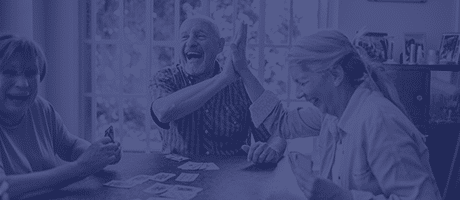We Share The Care So You Can Savor The Moment
Creating harmony between patient, families and our hospice team, helping to elevate the connection of human spirit and savored moments.
Why Choose St. John’s?
St. John’s hospice team cares first for the patient, and, second, for the family. Our team has been noted for two distinguishing features of hospice care:
Top Patient Satisfaction Scores
Family members and friends of patients give us top satisfaction survey scores among Medicare-certified hospices in Yellowstone County. We consistently earn high scores. Here is what they said we did best:
- Provide timely help
- Pain Management
- Provide emotional and spiritual support
- Communicate regularly with family
- Provide support and education to patient care-givers
High Staff-to-Patient Ratios
We pride ourselves on our high staff-to-patient ratios. We adjust staffing as our patients’ needs, and the needs of their families, change. This is who makes up our interdisciplinary team of professionals:
- Physicians and nurses: oversee and maintain patient care
- CNAs: help with activities of daily living
- Social workers: coordinate community resources
- Chaplains: give spiritual support at the end of life
- Bereavement coordinators: help patients and families deal with grief
- Volunteers: offer companionship and support
- Counselors and therapists: provide dietary advice and consultative therapies, as needed
COMPASSIONATE HOSPICE CARE
When you or a loved one are in need of end-of-life care, choose the name you trust. The comfort that St. John’s United provides is second to none.

Services
A Plan Provides Assurance
Our high-quality hospice care starts with a detailed plan, carefully tailored to meet the special needs of the patient and family.
Our services include:
- Visits from our professional care team: nurse, social worker, home health aide, volunteer, and chaplain
- Medication to ease pain and control symptoms
- Medical equipment such as wheelchairs, hospital beds, bedside commodes, shower benches, etc.
- Incontinent supplies such as bandages and catheters
- Grief and loss counseling for the whole family

Where We Serve
Choose Care in the Place You Call Home
We care for many of our hospice patients in their home or the home of a loved one. We also provide services in skilled nursing facilities and assisted living communities across Yellowstone County, including those on our campuses. Our high staff-to-patient ratio allows us to deliver exceptional care to patients in the place where they are most comfortable.

FAQs
What is hospice care?
Hospice is really a philosophy of care. It is our mission to treat the person, rather than the disease — and focus on quality of life. Hospice care helps people with life-limiting illness live their final months in comfort and dignity. Hospice surrounds the patient and family with a team of specialists who offer medical assistance combined with emotional and spiritual support.
What services does hospice provide?
- Physicians (the patient’s own physician and the hospice physicians, who are specialist in controlling pain and other symptoms of serious illness) prescribe medications and other methods of pain and symptom control.
- Nurses create an evolving plan of care as the patient’s needs change.
- Certified nurse assistants provide personal care and help the patient and family with activities of daily living. They also provide companionship and valuable emotional support.
- Social workers coordinate community resources and help the patient and family with non-medical concerns. They help with family dynamics and provide emotional support including funeral planning. Grief support continues for 13 months after the death of a hospice patient.
- Chaplains help patients and families cope with spiritual questions and concerns at the end of life, either directly or by coordinating services with the patient’s and family’s spiritual advisors.
- Bereavement coordinators help patients and families deal with grief. Grief support services continue for at least one year after the death of a hospice patient.
- Volunteers are partnered with patient’s based on similar interests providing emotional and social engagement.
- Therapists and counselors provide dietary advice, and physical, occupational or speech therapies as needed to support patient’s plan of care.
Hospice also provides medications, medical equipment and supplies necessary to promote comfort at home or in other hospice settings.
Who pays for hospice?
Medicare, Medicaid and most private insurance companies cover most hospice services. We will work with you to contact your insurance company to learn about individual coverage and any co-payments.
When is the right time to ask about hospice?
Sooner than later. End-of-life care may be difficult to discuss, but it is wise for family members to communicate their wishes long before it becomes a concern. These conversations can greatly reduce stress when it is time for hospice services, and help ensure that patients make an educated decision that includes input from family members and loved ones. Outreach Coordinators are available to provide an informational regarding Medicare guidelines for Hospice services.
Is hospice just for cancer patients?
No, hospice is appropriate for any patient with a terminal illness and a prognosis of less than six months. Cancer, kidney disease, Parkinson’s, ALS, multiple sclerosis, liver disease, HIV/AIDS, Alzheimer’s and dementia are on the short list of ailments our patients have.
When is the best time to start hospice care?
Most patients and families who receive hospice care say they wish they had known about it earlier, and that they really needed the help and support much sooner than they received it. Experts agree that at least two to three months of care is optimal and can help increase the quality of life for the patient and the emotional support for family and loved ones. If you think that your family member or the person you care for could benefit from pain or symptom management, emotional and spiritual support – or any of the other services hospice can offer – ask you physician if the timing might be right.
What if I choose hospice than live for more than six months?
Hospice care does not automatically end after six months. Medicare and most other insurers will continue to pay for hospice care as long as a physician certifies that the patient continues to have a limited life expectancy.
How can hospice care help me and my family?
Many families have little or no experience caring for someone who is dying. The hospice team can help you and your family or loved ones in many ways. For example, the hospice team provides comfort care to relieve pain and symptoms, offers emotional and spiritual support, teaches specific care techniques, arranges for necessary equipment, and answers questions you or your family may have.
When is hospice care available to me?
The hospice team will talk to you and your family about how often you need regular visits and then schedule them. The hospice team itself does not provide 24-hour care but can help make arrangements if that is what you need. Hospice care includes access to a registered nurse who is on-call 24 hours a day, 7 days a week for emergency situations.
Do I have to live at St. John’s to have Hospice care?
No. St. John’s United serves all of Yellowstone County. So whether you live in your own home, an assisted living community or skilled nursing facility our caring and committed Hospice team can provide services in the place you call home.
How can I learn more about becoming a Hospice Volunteer?
Contact SJU Home Health and Hospice at 406-655-5800 and ask for the Volunteer Coordinator.
How can I learn more?
Contact St. John’s United Home Health and Hospice and ask to speak to an Outreach Coordinator at 406-655-5800.
Contact Us
For more information, please contact us at:
Phone: (406) 655-5800
Hours: 8:00 am – 5:00 pm • M. – F.
After Hours: (406) 671-1341, Available 7 days a week, 24 hours a day
Address: 502 N. 30th St., Billings, MT 59101
When St. John’s United developed our new tagline, “So Much Life to Live,” we considered how this applies to every group we serve. Clearly, our young people and older adults enjoy years of a fine quality of life. But what about our hospice patients? We wondered, “Do they have so much life to live?”
We quickly realized that our patients live a better quality of life and often live longer because of hospice care. St. John’s United would like to thank you for your support. Please consider taking a few minutes to offer a review and spread the good word!




